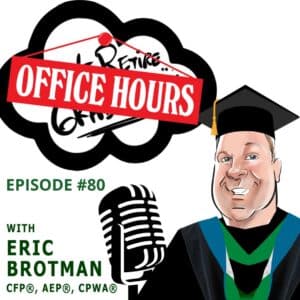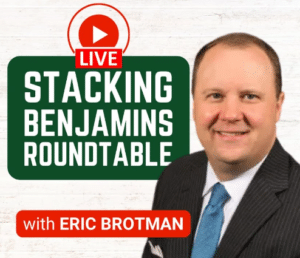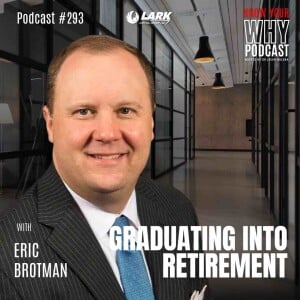In today’s Office Hours, Eric answers Colby’s question: “When should somebody start investing?”
The short answer is as soon as you have money available to invest, but the conversation doesn’t stop there.
Have a question? Tweet it to us at @BrotmanPlanning or post it on our Facebook and it may be used in a future episode of Office Hours!
Welcome to Don’t Retire Graduate, the podcast that asks you what you want to be when you grow up so you can graduate into retirement with purpose and passion. I’m your host and Valedictorian Eric Brotman. Welcome to Office Hours, where we answer listeners questions about personal finance, retirement readiness, and more. We received a question from Colby, who asked us, when should someone start investing? And Colby, I think there are a couple of different ways to answer that question. So let’s begin with what I feel is the most basic answer, which is as soon as you’re able, because time is on your side when you start earlier. So any type of investing that you’re going to do relies on a couple of variables. It relies on how much you’re putting away, how often or how regularly, what it’s invested in, and how it’s growing, and then how long it has to grow or mature. And so the short answer on when should someone start investing is as soon as you have capital that you can invest. But the conversation can’t end with that, because there are other variables at play here. For example, if you’re a young person just starting out in your career and you want to begin investing, but you have enormous student loans or other debt, it may be important to to knock some of that out first and to sort of fill the hole in before you start digging, before you start building the castle. So that’s number one. Number two, figuring out how and where to invest will depend a little bit on what your employer has to offer. So if you have the ability to begin investing in a 401, for example, and there’s an employer match, that’s free money. It’s worth taking even if you have some other debt or other issues. But when you invest, you have to consider your time horizon. Are you investing for the long term? Are you investing for a short term or a more immediate goal? If you’re investing for the long term, you can put things into tax shelters or tax favored investments or other things where you really don’t have access to your capital until you’re much older in many cases, and that’s okay. But if you’re investing for something like a first home or college for your kids, or just simply having a war chest, then sometimes it makes sense to be a little bit more thoughtful, a little bit more conservative, and to stay reasonably liquid so that you can access your capital. So, Colby, just to reframe this, when should someone start investing? It’s always better to start sooner than later and to be consistent along the way. If there are things that you need to tie up or clean up first, I would strongly encourage you to do that first and then looking at the various options, find the free money, whether it’s a match in a health savings account, whether it’s a match in a 401K or profit sharing plan. Whether it’s a stock purchase plan where you can buy company stock and get a discount on it, there are lots of different ways to do that which you can amplify your investing by having some, essentially, assistance from another party. So hopefully that was helpful to you. If you’re contemplating getting started in investing, make sure you know what you’re doing. First and foremost, this is not a hobby and it’s not a game. It is absolutely something you need to understand and consider using a professional advisor, whether that’s a robo advisor or an online service or a financial advisor like us, or an investment manager or somebody, so that you have dispassionate advice and a sounding board and an accountability partner so that you can stay on track. Because kind of like joining a gym. If you join and you don’t go, you’re kind of messing it up. And so some people need a personal trainer or somebody to work out with so that they’re in this game together, and they make sure that they hold each other accountable to it. Colby, I wish you well, and if you haven’t started investing based on your question, I would say get started, but get started in a very thoughtful, methodical way, and only if, in fact, financially you’re ready to do so. So thank you for your question, Colby. It was terrific. If you’d like to send us a question which we might answer in a future episode of Office Hours, please post it on our Facebook page or tweet us at brotman planning. I’d like to thank all of you for listening today. We’d love to hear from you, so please send us a message or leave us comments on don’t retiregraduate.com or social media sites and leave ratings and reviews on your favorite podcast platform. If you enjoy the show, don’t keep us a secret. Tell your friends and family so they can join you on your path to financial freedom. Thanks for coming to office hours. Be sure to tune in for new content every Thursday. For now, this is your host, Eric Brotman, reminding you, don’t retire. Graduate.







